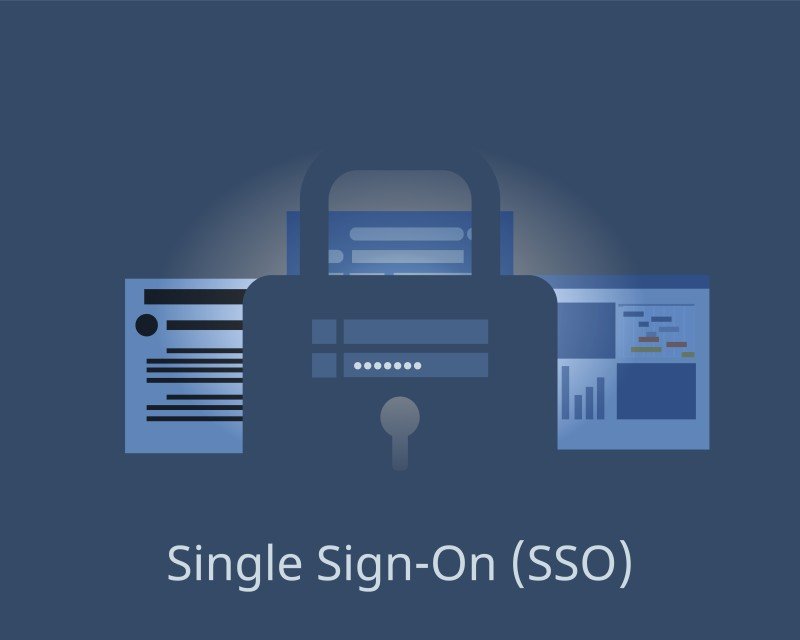
Data breaches, phishing attacks, and other cybercrime schemes have increased. Cyber criminals target small businesses as well as major corporations. And the truth is, it’s possible for a cyber-attack to put a business out of operation in a few months.
Many data breaches are caused by compromised credentials. But as more business operations move to the cloud, how will this ensure the safety and security of your data?
Significantly, one of the tools that helps secure business data and information is the single sign-on (SSO) solution. Click to find out more features and easy-to-use tools to protect your business from internet risks.
What Is Single Sign-On?
Single sign-on allows users to log in once and access all the resources they need. It eliminates the requirement for individual application and system accounts and passwords.

Users sign in once, and the solution sends the credentials to the various apps and systems. Google is a popular example. Signing into your Google account gives you access to Gmail, YouTube, Google Drive, Sheets, Play, and other Google apps.
On the other hand, SSO can be included in a password management tool if the technology serves as a central trust broker for an organization, rather than merely “vaulting” or storing various passwords.
Meanwhile, the deployment options for SSO solutions vary. Some run on-premises, others in the cloud. But SSO in the cloud is becoming more popular. Most providers offer at least one software as a service (SaaS) alternative in addition to on-premises software. Many now prefer SaaS-only SSO.
SaaS is the fastest growing segment of SSO. As a result, vendors seeking to succeed will need to offer cloud-based SSO services.
Benefits Of SSO
The sheer volume of user data can be intimidating for businesses that employ security measures on both cloud and on-premise networks. Without SSO, each website or app must authenticate independently. To do so, the site must keep its own private user database.
Individual login credentials for every website, program, and application are required for every enterprise user, including clients and contractors. This setup causes security issues, costly administration expenses, and inefficiency. That’s where single-sign on can help. It helps businesses with:
- SSO Strengthens Security
Since SSO allows you to log into all your apps with one login, most people believe it weakens security. After all, everything is in one place. In reality, SSO can reduce risk by following a few simple rules. Using SSO encourages users to establish better passwords. Theft and hacking are less likely.
Multi-factor authentication (MFA) is another option. MFA sends a code to the user’s phone or email when they first log in from a new device. That gives users peace of mind when signing in.
Another aspect of SSO security to consider is when a worker resigns or leaves the business. SSO enables the organization to centrally control access to all apps via a single centrally managed identification (ID). When an employee leaves, the company just needs to revoke the person’s user account.
- SSO Tightens Business To Business (B2B) Collaboration
SSO is also important in B2B collaborations. Everything from automobiles to smartphones is created and distributed by many companies working together. Federated SSO can help businesses collaborate more efficiently by linking identity systems. This form of business collaboration allows other organizations’ personnel access to certain digital tools and data.
Many companies also work together to deliver relevant services to shared clients. Using SSO across security mechanisms allows customers to access many businesses’ services from a single account.
- Shadow IT Is Prevented
Shadow IT is nothing new in the cybersecurity sector. It refers to information technology devices, software, and services that aren’t owned or controlled by IT organizations.
Shadow IT was formerly limited to employees acquiring software from office supply stores. However, as cloud-based downloads become more commonplace, the risk potential increases.
To address this issue, IT administrators can utilize SSO to track which apps employees use. As a result, identity theft threats can be minimized.
- It Lowers Information Technology (IT) Costs
SSO saves time on password resets. Workers will forget passwords if each app requires a unique login and password for each employee. With SSO, users simply need to remember one set of credentials, decreasing help requests, thus reducing security issues.
Most SSO solutions also allow users to reset their own passwords, minimizing IT involvement. A unified access management system’s SSO uses a common directory to provision and de-provision users, therefore saving time and money.
There are policies for users with specific roles and locations. Employees, contractors, and customers can be provided across various applications in one action, rather than individually. De-provisioning takes minutes instead of hours.
- It Helps In Regulatory Compliance Adherence
Compliance is a challenging issue in many industries, and businesses know that not complying can result in substantial fines and penalties. In order to comply with major regulations, businesses must guarantee data security and full disclosure.
Trying to meet all of the requirements can be difficult and costly. Using a single SSO solution can help your business fulfill compliance requirements. To get the best value for money, organizations should look for these features in an SSO service.
Conclusion
Businesses should protect sensitive data and information and slam the door on security threats. Identity management is changing as more businesses move to hybrid or cloud environments. As this change continues, using SSO can significantly improve your organization’s security efforts.

Working as a cyber security solutions architect, Alisa focuses on application and network security. Before joining us she held a cyber security researcher positions within a variety of cyber security start-ups. She also experience in different industry domains like finance, healthcare and consumer products.











